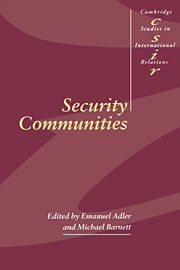Book contents
- Frontmatter
- Contents
- Notes on contributors
- Acknowledgements
- Part I Introduction and theoretical overview
- Part II Studies in security communities
- 3 Insecurity, security, and asecurity in the West European non-war community
- 4 Seeds of peaceful change: the OSCE's security community-building model
- 5 Caravans in opposite directions: society, state and the development of a community in the Gulf Cooperation Council
- 6 Collective identity and conflict management in Southeast Asia
- 7 An emerging security community in South America?
- 8 Australia and the search for a security community in the 1990s
- 9 The United States and Mexico: a pluralistic security community?
- 10 No fences make good neighbors: the development of the US-Canadian security community, 1871–1940
- 11 A neo-Kantian perspective: democracy, interdependence and international organizations in building security communities
- Part III Conclusions
- Index
- CAMBRIDGE STUDIES IN INTERNATIONAL RELATIONS
7 - An emerging security community in South America?
Published online by Cambridge University Press: 30 October 2009
- Frontmatter
- Contents
- Notes on contributors
- Acknowledgements
- Part I Introduction and theoretical overview
- Part II Studies in security communities
- 3 Insecurity, security, and asecurity in the West European non-war community
- 4 Seeds of peaceful change: the OSCE's security community-building model
- 5 Caravans in opposite directions: society, state and the development of a community in the Gulf Cooperation Council
- 6 Collective identity and conflict management in Southeast Asia
- 7 An emerging security community in South America?
- 8 Australia and the search for a security community in the 1990s
- 9 The United States and Mexico: a pluralistic security community?
- 10 No fences make good neighbors: the development of the US-Canadian security community, 1871–1940
- 11 A neo-Kantian perspective: democracy, interdependence and international organizations in building security communities
- Part III Conclusions
- Index
- CAMBRIDGE STUDIES IN INTERNATIONAL RELATIONS
Summary
The paucity of major wars in Latin America constitutes a major challenge to international relations theory and provides especially fertile ground for thinking about the nature of security communities. For the first half-century following independence, the region was beset by persistent and widespread wars of state formation and nation building, both internal and external. In this, as in so many other ways, Latin America foreshadowed the pattern of subsequent postcolonial conflicts and, by no stretch of the imagination, could be viewed as constituting a security community. However, since the late nineteenth century both the number and the intensity of interstate wars between Latin American states have been remarkably low - despite the existence of large numbers of protracted and militarized border disputes, many cases of the threatened use of force and of military intervention by outside powers, high levels of domestic violence and political instability, and long periods of authoritarian rule.
Explanations follow predictable lines. Realists and neorealists look to geopolitical location, to the varying degree of insulation from extraregional influences, and to the hegemonic or policing role of, first, Britain and then the United States. Within the region, they highlight the emergence of relatively autonomous regional balances of power (for example between Brazil, Argentina and Chile), as well as other material factors which worked to restrain conflict - the absence of transport links, borders that were geographically removed from centres of political and economic activity, and military technologies that made it extremely difficult to bring power to bear in offensive wars of conquest.
- Type
- Chapter
- Information
- Security Communities , pp. 228 - 264Publisher: Cambridge University PressPrint publication year: 1998
- 46
- Cited by



